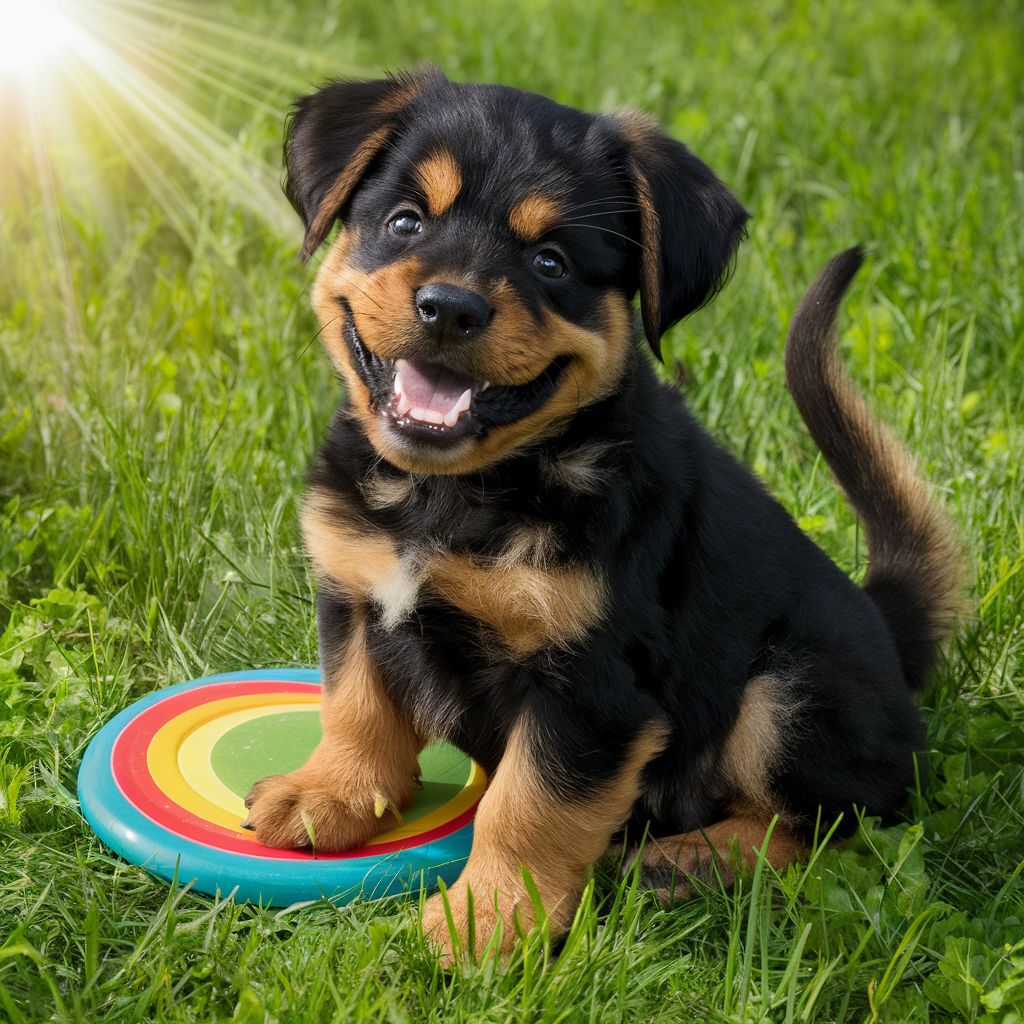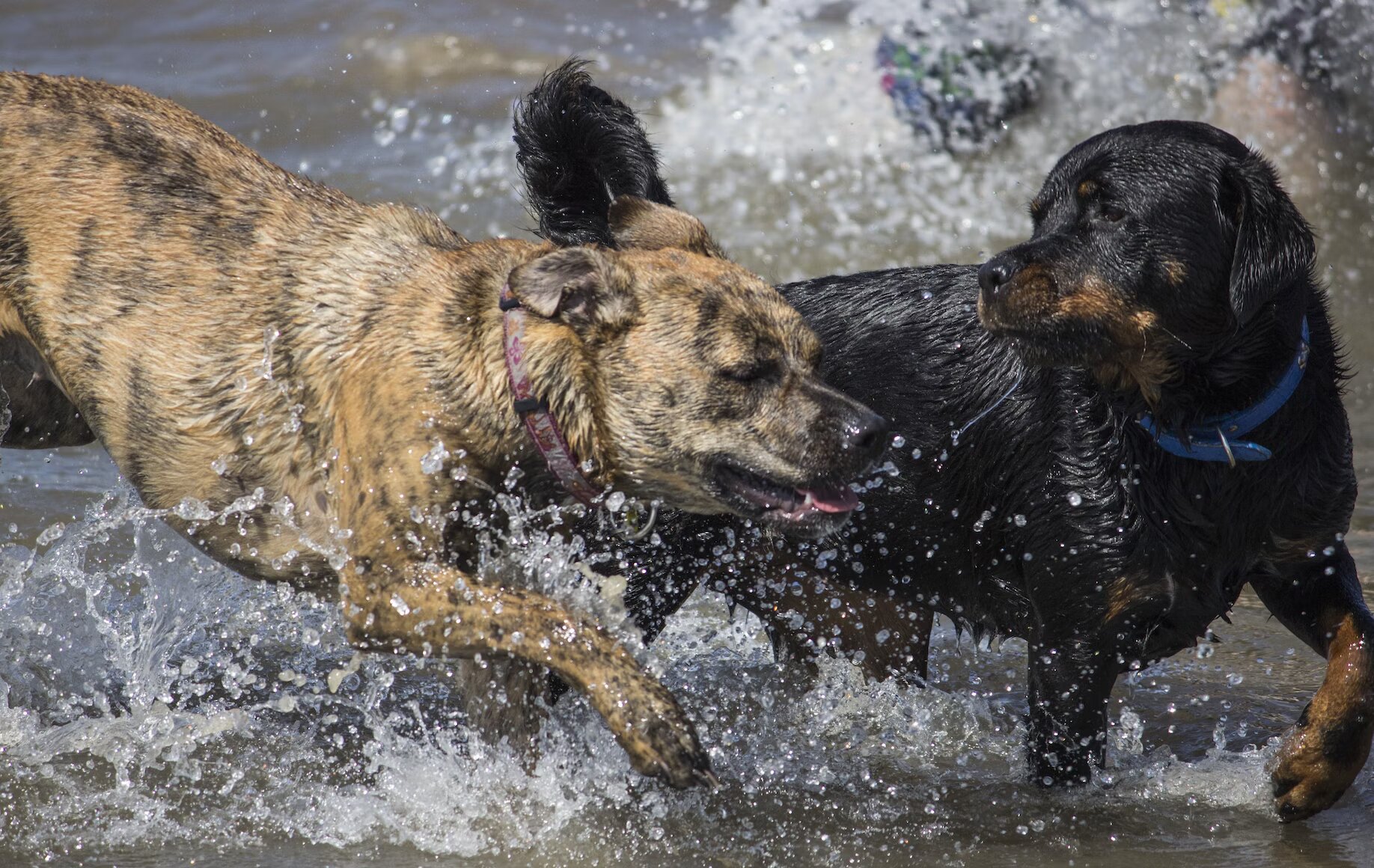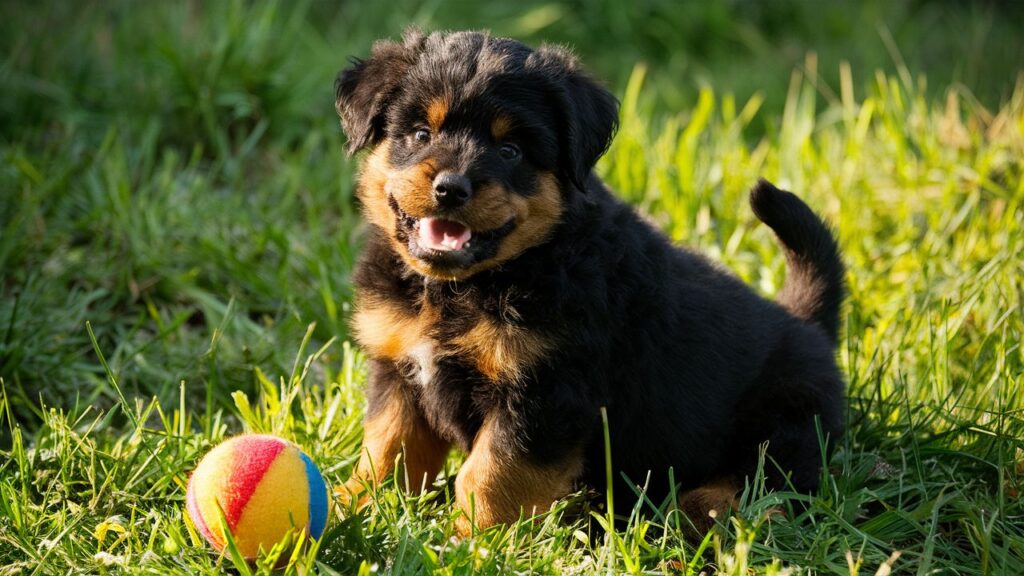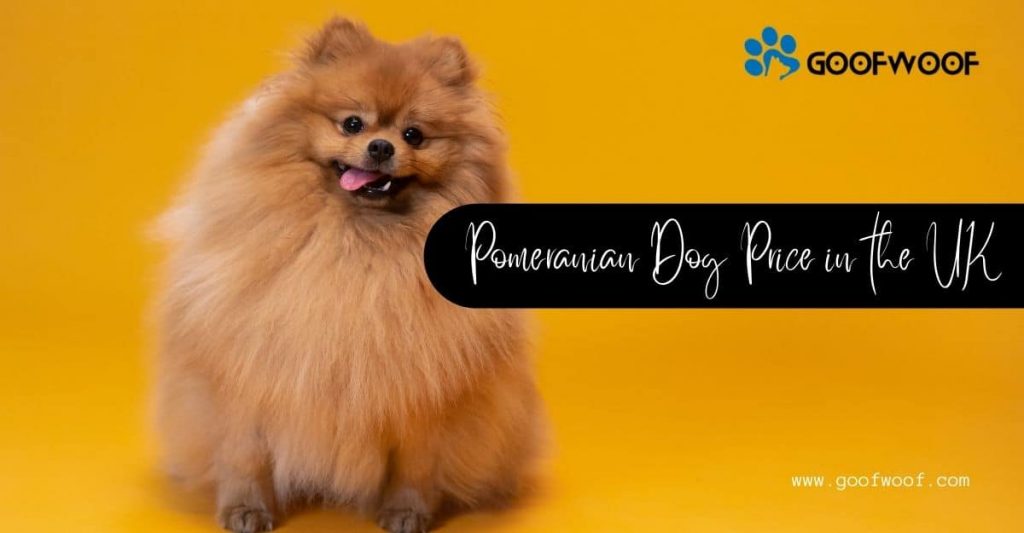The Rottweiler, often referred to as a “Rottie” or “Rott,” is a powerful and intelligent breed known for their strength, loyalty, and distinctive black and tan coat. They are often described as confident, fearless, and good-natured. Early socialization and proper training are crucial for bringing out the best in these dogs. When raised with love and care, Rottweilers make excellent family pets and are particularly good with children.
One of the remarkable qualities of Rottweilers is their versatility. Beyond being family companions, they excel in various working roles. Due to their intelligence and trainability, they are often employed as police dogs, search and rescue dogs, and even as therapy dogs. Their protective instincts make them excellent guard dogs.

What is the average price of a Rottweiler in the UK?
The average cost of a Rottweiler is around £1000 to £3000.
Here is a table outlining the cost of owning a Rottweiler in the UK, including various expenses and yearly estimates:
| Expense Type | Description | Yearly Estimate |
|---|---|---|
| Purchase Cost | Cost of buying a Rottweiler puppy from a reputable breeder or shelter | £1,000 – £3,000 |
| Vaccinations | Initial vaccinations (including distemper, parvovirus, rabies, etc.) | £50 – £100 |
| Neutering/Spaying | Surgical procedure to neuter (male) or spay (female) the Rottweiler | £100 – £300 |
| Microchipping | Implantation of a microchip for identification purposes | £10 – £20 |
| Food | High-quality dog food, treats, and supplements | £300 – £600 |
| Training | Basic obedience classes, advanced training, and behavior modification | £100 – £500 |
| Veterinary Care | Routine check-ups, emergency visits, medications, and flea/tick prevention | £200 – £1,000 |
| Pet Insurance | Health insurance coverage for accidents, illnesses, and injuries | £200 – £500 |
| Grooming | Brushes, shampoos, grooming tools, and professional grooming services | £100 – £300 |
| Toys and Accessories | Collars, leashes, beds, toys, and other accessories | £50 – £200 |
| License and Registration | Local council licensing fees and registration | £20 – £50 |
| Miscellaneous Expenses | Unexpected costs such as boarding, pet sitters, and other incidentals | £100 – £500 |
| Total Yearly Estimate | £1,830 – £6,570 |
Please note that these estimates can vary based on factors such as the dog’s age, health, size, location, and individual preferences. It’s essential to budget for potential emergencies and unforeseen expenses when considering the cost of owning a Rottweiler.
Let’s delve into each section in detail:
1. Purchase Cost: The purchase cost of a Rottweiler in the UK can vary widely depending on several factors. If you buy from a reputable breeder with health-tested parents and a good lineage, the cost can range from £1,000 to £3,000 or even higher for show-quality or champion bloodline puppies.
On the other hand, adopting from a shelter or rescue organization may have lower upfront costs, typically ranging from £200 to £500, but it’s essential to consider potential healthcare and training needs.
2. Vaccinations: Rottweiler puppies require a series of vaccinations to protect them from common diseases. Initial vaccinations typically include shots for distemper, parvovirus, adenovirus, parainfluenza, leptospirosis, and sometimes rabies. The cost for these vaccinations, including vet visits and administration fees, can range from £50 to £100 or more, depending on the veterinary clinic’s pricing.
3. Neutering/Spaying: Neutering (for males) or spaying (for females) is a surgical procedure that prevents unwanted pregnancies, reduces certain health risks, and can help with behavioral issues.
The cost of neutering or spaying a Rottweiler can range from £100 to £300 or more, depending on the dog’s size, age, and the veterinary clinic’s fees.
4. Microchipping: Microchipping involves implanting a small microchip under your Rottweiler’s skin, which contains a unique identification number. This is a legal requirement in the UK for all dogs over a certain age (usually 8 weeks). The cost of microchipping is relatively low, typically ranging from £10 to £20, and it’s a one-time expense.
5. Food: Rottweilers are large and active dogs that require high-quality food to maintain their health and energy levels. The cost of food can vary depending on the brand, quality, and whether you choose dry kibble, wet food, or a combination. On average, you can expect to spend between £300 to £600 annually on food, treats, and supplements for your Rottweiler.
6. Training: Training is crucial for Rottweilers to develop good behavior, obedience, and socialization skills. This includes basic obedience classes, advanced training for specific commands or activities, and behavior modification sessions if needed.
The cost of training can vary widely depending on the trainer’s experience, training methods, and the duration of classes. On average, you may spend between £100 to £500 per year on training expenses.
7. Veterinary Care: Regular veterinary care is essential to keep your Rottweiler healthy and up-to-date on vaccinations, check-ups, and preventive treatments. This includes routine vet visits, emergency care if needed, medications for parasite control, and flea/tick prevention products. The cost of veterinary care can range from £200 to £1,000 or more annually, depending on your Rottweiler’s health needs and any unexpected medical expenses.
8. Pet Insurance: Pet insurance provides financial protection against unexpected veterinary costs due to accidents, illnesses, or injuries. The cost of pet insurance can vary based on factors such as your Rottweiler’s age, breed, health history, coverage limits, and deductibles. On average, you might pay between £200 to £500 per year for pet insurance coverage.
9. Grooming: Rottweilers have a short coat that is relatively easy to maintain, but they still require regular grooming to keep their coat healthy and free of mats or tangles. Grooming expenses include brushes, shampoos, grooming tools, and occasional professional grooming services. The cost can range from £100 to £300 per year, depending on whether you groom your Rottweiler at home or use professional services.
10. Toys and Accessories: Toys, collars, leashes, beds, and other accessories are necessary for your Rottweiler’s comfort, entertainment, and safety. The cost of toys and accessories can vary based on the type and quality of items you choose. On average, you may spend between £50 to £200 per year on toys and accessories for your Rottweiler.
11. License and Registration: In the UK, dog owners are required to license and register their pets with the local council. The cost of licensing and registration fees can vary depending on your location and the specific requirements of your local council. Typically, you might pay between £20 to £50 annually for licensing and registration.
12. Miscellaneous Expenses: These are additional expenses that may arise unexpectedly, such as boarding fees when you travel, pet sitting services, grooming supplies, or other incidentals related to owning a Rottweiler.
It’s essential to budget for miscellaneous expenses to handle unforeseen costs throughout the year. On average, you might set aside between £100 to £500 per year for miscellaneous expenses.
Overall, the total yearly estimate for owning a Rottweiler in the UK ranges from £1,830 to £6,570 or more, depending on various factors such as your Rottweiler’s age, health, lifestyle, location, and individual preferences for care and services. It’s essential to budget for these expenses to provide your Rottweiler with proper care, nutrition, and veterinary attention.
Factors that Influence Rottweiler Puppy Prices
Determining the cost of a Rottweiler in the UK involves considering various factors such as the dog’s pedigree, lineage, health, and the breeder’s reputation. If you’re looking to bring a Rottweiler into your family, it’s essential to be aware of the potential costs involved to ensure you are making a well-informed decision.
Breeder Reputation:
- Reputable breeders often charge more for their Rottweilers because they invest in quality breeding practices. Responsible breeders prioritize the health and well-being of the dogs, including proper vaccinations, regular veterinary check-ups, and a clean living environment. This dedication to quality often reflects in the price of the puppies.
Pedigree and Lineage:
- The pedigree of a Rottweiler significantly influences its cost. Dogs from champion bloodlines or those with a notable lineage may be more expensive. Pedigree documents from recognized kennel clubs, such as The Kennel Club in the UK, can provide information about the dog’s ancestry and any titles or achievements in its lineage.
Health Screening:
- Rottweilers, like many large breeds, can be prone to certain health issues. Reputable breeders conduct health screenings for common problems such as hip dysplasia, elbow dysplasia, and heart conditions. Puppies from breeders who invest in health screening may cost more due to the additional care and testing involved.
 Training and Socialization:
Training and Socialization:
- Some breeders start basic training and socialization with their puppies, which can influence the cost. Well-trained and socialized Rottweilers may be priced higher due to the extra effort and time the breeder has invested.
Inclusions in the Price:
- Consider what is included in the price. Reputable breeders often provide vaccinations, microchipping, a starter kit, and sometimes even initial training. These inclusions can add value to the overall cost.
Local Demand and Availability:
- Prices can vary based on the local demand for Rottweilers and their availability. In regions where the breed is less common, prices may be higher. It’s essential to research the market in your specific area.
Age of the Puppy:
- The age of the puppy can affect the price. Younger puppies may be more expensive than older ones.
- It’s crucial to emphasize that choosing a breeder based solely on price is not advisable. Quality, reputation, and ethical breeding practices should be the primary considerations. Adopting from shelters or rescue organizations is also a commendable option for those looking to provide a loving home for a Rottweiler.
FAQ:
Q: How often should I feed my Rottweiler?
A: Rottweilers are large dogs with varying energy levels. Feed them high-quality dog food in two meals per day. Adjust the quantity based on their age, weight, and activity level.
Q: How much exercise does a Rottweiler need?
A: Rottweilers are an active breed and require regular exercise. Aim for at least 30 to 60 minutes of daily exercise, which can include walks, playtime, and interactive activities.
Q: Are Rottweilers good with children?
A: Rottweilers can be excellent family dogs if properly trained and socialized from a young age. Supervise interactions between Rottweilers and young children, and teach kids how to behave around dogs.
Q: How do I train my Rottweiler?
A: Start training early and use positive reinforcement techniques. Rottweilers respond well to consistent, firm, and positive training. Socialization is crucial to ensure they are well-behaved around people and other animals.
Q: How often should I groom my Rottweiler?
A: Rottweilers have a short, dense coat that sheds moderately. Brush their coat at least once a week to remove loose hair and minimize shedding. Regularly check ears, teeth, and nails.
Q: Are Rottweilers prone to specific health issues?
A: Rottweilers can be susceptible to hip dysplasia, heart problems, and certain genetic conditions. Regular veterinary check-ups, a balanced diet, and appropriate exercise can help maintain their overall health.
Q: What is the ideal living environment for a Rottweiler?
A: Rottweilers are adaptable but thrive in environments where they have enough space to move around. They can live in apartments if given sufficient exercise. A fenced yard is beneficial for play and exercise.
Q: How can I socialize my Rottweiler?
A: Early socialization is crucial. Expose your Rottweiler to various people, places, and situations. Enroll in puppy classes and provide positive experiences to help them become well-adjusted adults.
Q: What is the average lifespan of a Rottweiler?
A: The average lifespan of a Rottweiler is around 9 to 12 years. Providing a healthy diet, regular exercise, and veterinary care can contribute to a longer and healthier life.
Before committing to purchasing a Rottweiler, potential owners should thoroughly research breeders, ask questions, and, if possible, visit the breeder’s facility to ensure the well-being of the dogs. Remember that owning a dog, regardless of breed, comes with responsibilities, including proper training, socialization, veterinary care, and a lifetime commitment to the well-being of your furry friend.



